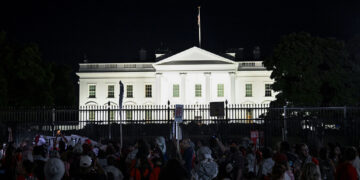Congress should pass the Upholding Human Rights Abroad Act, reintroduced by Senator Chris Van Hollen (D-Md.) and Congresswoman Sara Jacobs (D-Calif.), in order to close loopholes in the Leahy Laws, conduct needed oversight of Pentagon security cooperation programs, and ensure that the U.S. does not provide security assistance to human rights violators, said 16 human rights organizations, including Democracy for the Arab World Now (DAWN).
Specifically, the Upholding Human Rights Abroad Act would:
- Require the Department of Defense to create processes and report on steps taken to ensure recipients of both Section 127e and Section 1202 programs have not committed gross violations of human rights;
- Require the Department of Defense to conduct Leahy human rights vetting for both Section 127e and Section 127d potential recipients;
- Expand reporting requirements to include an assessment of how Section 127e and Section 127d programs advance U.S. national security priorities and aligns with other U.S. Government efforts in the countries of recipients; and
- Consistent with Section 127d, clarify that Section 127e does not authorize the introduction of US armed forces into hostilities, U.S. Special Operations that are not otherwise authorized, or activities that are inconsistent with the laws of armed conflict.
A press release on the Upholding Human Rights Abroad Act, along with the names of other supporters of the bill, is below. The full text of the bill can be viewed here.
March 21, 2024
Van Hollen, Jacobs Reintroduce Legislation to Expand Human Rights Safeguards on U.S. Security Cooperation Program
Upholding Human Rights Abroad Act would close loopholes in human rights vetting in Pentagon security cooperation programs
WASHINGTON – Today, Senator Chris Van Hollen (D-Md.) and Congresswoman Sara Jacobs (D-Calif.) reintroduced the Upholding Human Rights Abroad Act, legislation to close loopholes in the Leahy Laws, conduct needed oversight of Pentagon security cooperation programs, and ensure that the United States does not provide security assistance to human rights violators. This bill would also increase transparency and expand reporting requirements to bolster oversight.
While U.S. law prohibits the provision of security assistance to recipients that have been found to have committed gross violations of human rights – known as the Leahy Law – concerning loopholes remain. Specifically, two security cooperation programs under the Department of Defense – "Section 127 echo" and "Section 127 delta" – are not subject to human rights vetting. The Upholding Human Rights Abroad Act closes these loopholes.
"The United States has an obligation to ensure that our security assistance is used in a manner consistent with our interests and values. But longstanding legal loopholes have permitted the Pentagon to sidestep that responsibility when it comes to some security cooperation programs," said Senator Van Hollen. "This legislation closes these problematic loopholes to ensure American taxpayer-funded security assistance is used in line with American values."
"U.S. military operations and our tax dollars should always align with our values and uphold human rights – no matter where we are in the world, the mission at hand, or the level of secrecy we're dealing with. But loopholes in Leahy Law mean that our allies and military partners could circumvent our values, commit human rights violations, and receive U.S. military support and assistance anyway. That's why I'm proud to reintroduce the Upholding Human Rights Abroad Act so we can plug these loopholes and ensure full human rights vetting of the 127e and 127d programs. Fixing this oversight will help advance our foreign policy goals and ensure that our tax dollars aren't inadvertently fueling the conflict and violence that we're aiming to solve," said Rep. Jacobs.
U.S. law permits the Secretary of Defense to expend up to $100 million per year to provide support to partners who facilitate or support authorized U.S. special operations forces to combat terrorism. According to open-source reporting, this authority has been used to conduct operations in Somalia, Libya, Kenya, Tunisia, Cameroon, Mali, Mauritania, and Niger – all of which have had serious concerns raised in the State Department's Country Reports on Human Rights Practices for years.
The Upholding Human Rights Abroad Act would close these loopholes in the Leahy Law so that the United States does not provide funding or support to recipients that have committed human rights violations.
Specifically, the Upholding Human Rights Abroad Act would:
- Require the Department of Defense to create processes and report on steps taken to ensure recipients of both Section 127e and Section 1202 programs have not committed gross violations of human rights;
- Require the Department of Defense to conduct Leahy human rights vetting for both Section 127e and Section 127d potential recipients;
- Expand reporting requirements to include an assessment of how Section 127e and Section 127d programs advance U.S. national security priorities and aligns with other U.S. Government efforts in the countries of recipients; and
- Consistent with Section 127d, clarify that Section 127e does not authorize the introduction of US armed forces into hostilities, U.S. Special Operations that are not otherwise authorized, or activities that are inconsistent with the laws of armed conflict.
Bill text can be viewed here.
This legislation is supported by: the American Friends Service Committee, Amnesty International USA, Brennan Center for Justice at NYU School of Law, Center for Civilians in Conflict (CIVIC), Center for International Policy, Center for Constitutional Rights (CCR), Democracy for the Arab World Now (DAWN), Friends Committee on National Legislation, Government Information Watch, Human Rights Watch, Middle East Democracy Center (MEDC), National Religions Campaign Against Torture, Oxfam America, Saferworld (USA), VoteVets, Win Without War.
"Secretive security cooperation programs like so-called 127e and 127d run serious risks of US support for violations of human rights and international humanitarian law. Yet for too long, the Pentagon has exempted these programs from legally required human rights due diligence and vetting. This critical legislation would close that loophole and help ensure that US funding and assistance does not support grave abuses in the name of national security," said Annie Shiel, US Advocacy Director, Center for Civilians in Conflict (CIVIC)
"The US government has the responsibility to vet recipients of its security assistance for serious human rights abuses," said Sarah Yager, Washington Director at Human Rights Watch. "If enacted, the Upholding Human Rights Abroad Act would fill dangerous and longtime gaps in the monumental Leahy Laws, which govern US vetting of security assistance recipients. The act would strengthen protections to ensure the United States is not partnering with those implicated in violations of human rights and international humanitarian law."
"The Upholding Human Rights Abroad Act is an important step toward ensuring that the United States is not using taxpayer dollars to fund or support gross violations of human rights in other countries under the guise of U.S. 'national security'," said Daphne Eviatar, Director, Security with Human Rights, Amnesty International USA.
"As a matter of both moral values and national security, the United States must do everything possible to refrain from supporting foreign forces that abuse human rights and violate international humanitarian law. This important legislation will close a significant loophole by ensuring that the Pentagon properly vets the human rights record of foreign forces and does not provide weapons and training to those in violation of these fundamental legal obligations," said Heather Brandon-Smith, Legislative Director for Foreign Policy, Friends Committee on National Legislation (FCNL).
"For far too long, overly broad laws have allowed US troops to be deployed to conflicts and security cooperation missions around the globe without sufficient congressional oversight. Advancing US security means working with partners who are committed to upholding US values — not violating human rights and undermining democracy. And we need far better oversight over programs like 127e that can lead to US servicemembers getting caught in hostilities and losing their lives, as four warriors did in the ambush in Tongo Tongo, Niger, five years ago. The Upholding Human Rights Abroad Act is an important step in reestablishing Congress's oversight role and upholding US values in our national security policies, and we are proud to support it," said Mary Kaszynski, Director of Government Relations, VoteVets.
"Credible civilian reports have documented the way 127e and 127d security cooperation programs have supported actors in serious violation of international humanitarian law," said Ari Tolany, Director of the Security Assistance Monitor at Center for International Policy. "Yet for too long, the Pentagon has dodged accountability by exempting these programs from standard human rights due diligence. This vital legislation would close that gap, so that U.S. funding and assistance does not drive gross violations of human rights under the banner of 'counterterrorism' or 'great power competition.'"





































